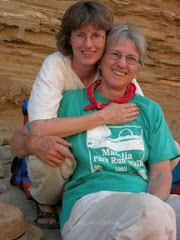 The current issue of Spirituality & Health: The Soul/Body Connection features an article entitled “What is a Good Death: A Hospital Chaplain Reflects on the Lessons from Her Patients.” One thing that attracted Karen Rushen to the spiritual care of the sick and dying was wanting “to know why some people appeared to have a ‘better death’ than others, passing from this life with less fear, pain, and resistance than other people.” She also wanted to look at her own “worst nightmares about sickness, pain, and end of life . . . .”
The current issue of Spirituality & Health: The Soul/Body Connection features an article entitled “What is a Good Death: A Hospital Chaplain Reflects on the Lessons from Her Patients.” One thing that attracted Karen Rushen to the spiritual care of the sick and dying was wanting “to know why some people appeared to have a ‘better death’ than others, passing from this life with less fear, pain, and resistance than other people.” She also wanted to look at her own “worst nightmares about sickness, pain, and end of life . . . .”Rushen shares several experiences from her years with dying patients, from newborns to the elderly. My favorite story is of an elderly woman dying of cancer. Her husband sat by her hospital bed, “sobbing pitifully for days on end. Finally he fell asleep from exhaustion, and that’s when his wife passed away. Yet when he woke up, he was calm upon finding out that his wife had died, telling the staff that he had just had a very powerful dream in which his wife assured him that she loved him, and that she was in a wonderful place, waiting for him to join her someday.”
Rushen ends her reflections by observing that her job has taught her that “each day is precious, that health is not to be taken for granted, and that the most horrendous suffering can contain gifts and life lessons.” She also found that by facing her own fears squarely and by daring to ask herself and others some of “life’s most daunting questions,” she “experienced a profound clarity” around her own life’s purpose.
We don’t have to become a hospital chaplain or a hospice volunteer to learn these lessons. We can learn from any of the many wonderful books available on what to expect and how best to prepare for our own death or that of a loved one, books such as Susan Dolan’s End of Life Advisor, the recently published Jane Brody’s Guide to the Great Beyond, David Kessler’s The Needs of the Dying, and Elisabeth Kubler Ross’ classic On Death and Dying. This 1969 publication started the whole cultural shift toward dealing with death more openly. My copy (cost: $1.95) may have started me on a path that forty years later, led to becoming a home funeral activist.
We can also study contemporary spiritual teachers such as Eckhart Tolle, Byron Katie, Stephen Levine, and the Dali Lama, or go back to one of my all time favorite books, the 2nd century Roman classic, Marcus Aurelius’ Meditations.
We can watch movies that neither avoid nor romanticize death, films such as . . . oh, that’s a topic for another day. Meanwhile, carpe diem!
Nancy


2 comments:
What a wonderful post -- incredibly moving. The article touches on so much I hadn't thought about. Looking forward to the next post!
Thanks, Dara. Glad you liked it. Looking forward to seeing you at the Beaver's Pond Press author meet-up tomorrow.
Becky
Post a Comment